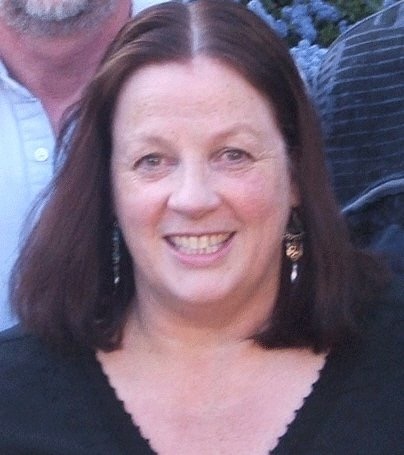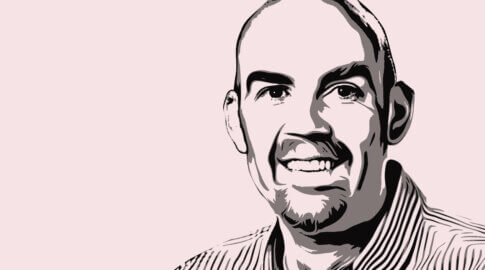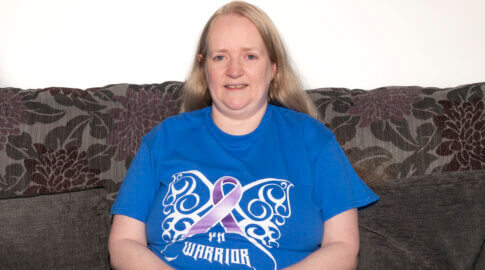Don’t give up – one woman’s bid for support
Myra Morrison of Frome in Somerset was diagnosed with a type of PH called CTEPH in March 2014 at the age of 61. She applied for Personal Independence Payments (PIP) and it took her a year of letters and appeals – plus a tribunal hearing – to finally be deemed eligible. Here, she shares her experience and encourages others to persevere and pursue the support they are entitled to.
I’d had a cough for ages and just ignored it, then people at work started saying how ill I looked and I went home early one day thinking I’d be right in a couple of days. By that evening I couldn’t manage the walk from the lounge to the kitchen without becoming severely breathless. My GP referred me to hospital and I was diagnosed with CTEPH following a pulmonary embolism within weeks. This came on top of my existing condition, rheumatoid arthritis (RA), which I’ve had since 2008.

A few months later, in November 2014, I decided to apply for PIP. My PH, on top of my RA, has had a dramatic effect on my everyday life. Every single task takes twice as long and I’m always having to sit down for five minute rests; take the stairs in two goes for example. Many people with PH know exactly what I’m talking about. I can’t lift heavy things and there are a lot of jobs I can no longer do by myself, so I rely much more on my husband and family for support. I know I am so much luckier than many people with PH, but I also know the impact on what I can do has been significant, so I decided to apply for that extra bit of support to help me and my husband cope.
No one in authority says ‘okay you may be able to get this’ so I had to work it out for myself.
No one in authority says ‘okay you may be able to get this’ so I had to work it out for myself. After checking with the DWP, Citizens Advice Bureau and PHA UK, I duly completed and sent back the lengthy forms needed to apply for PIP. After some time, I was invited to a face-to-face assessment carried out by ATOS healthcare
After another wait, I got a letter from the DWP stating I did not meet the criteria so would not be awarded PIP. I challenged this decision – especially on the grounds that I felt my ATOS assessment only took into account RA and did not consider my PH symptoms.
A further wait and then another letter of explanation detailing each point of the assessment and how the decision had been reached. I have to say there were times when I thought about giving up and just letting it go. It was hard to keep taking the responses I was getting, but, no, I decided to go on and appeal. This meant taking my application to tribunal. I was asked to supply further evidence to support my case and this included a letter from my consultant and a letter from the PHA UK too. I hoped they would look at all this additional evidence and give me a ‘paper decision’ but, no, I was told they
It was definitely worth sticking to and I am very grateful for the support PHA UK gave me in this process.
couldn’t agree a decision, and I was invited to attend a tribunal to be held in Bristol in December 2015.
I was very nervous about this, but it was honestly not as daunting as I was expecting. Everyone there was very nice and understanding. The panel consisted of a judge, a medical doctor and a person with expertise in daily living activities. They said my husband could come in with me if I wanted – but I decided to go in by myself. The panel asked me questions about the assessment process and then they asked for more details of how CTEPH and RA have affected my life. This took about half an hour and I was then asked to wait for fifteen minutes before being called back in and told they had reached the decision to allow my appeal. And I was thanked for being open and honest with them.
So, I now receive PIP and the added bonus is that it was backdated to my original claim date a year before. I receive the daily living component but not the mobility component, which means I don’t get a blue badge so we have to plan journeys to take into account parking and where I can be safely dropped off.
The whole process took over a year and at times I felt like I couldn’t be bothered and would give up, but then something inside me was saying, ‘fight it, it’s what you believe, they’re not listening to you.’ At the tribunal, I finally felt someone was listening and taking on board how my lifestyle has changed and all the adjustments I’ve had to make.
I know not everyone’ is the same and experiences are different, especially if there are other health factors involved, but for me it was definitely worth sticking to and I am very grateful for the support PHA UK gave me in this process.
My case is up for re-assessment again in November this year (2016) which feels quite soon, but I’m hoping this will just be a paper re-assessment through which I have to let them know of any changes – and as I have two progressive conditions that won’t go away, I hope this will be straightforward.
It wasn’t easy applying for PIP and at times I thought I couldn’t be bothered anymore but I really was determined. I’ve worked in the NHS and social services all my life, most recently working with carers of adults with learning disabilities, and I believe that people should get any benefits they are entitled to. I would like to urge others with PH to persevere.
















